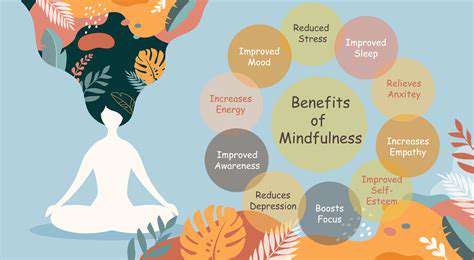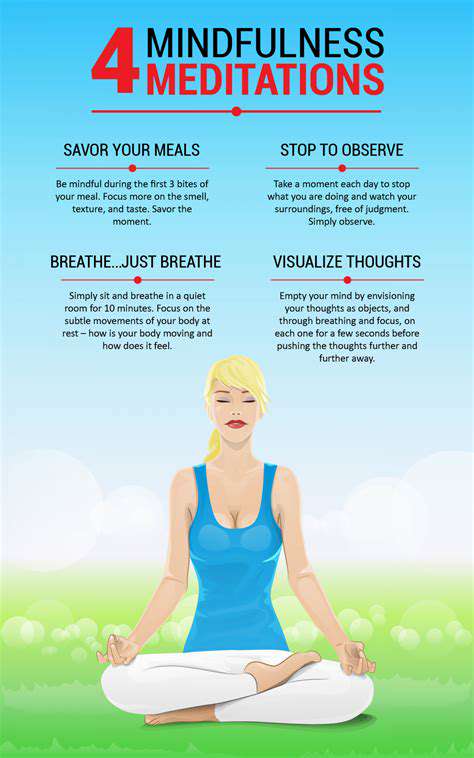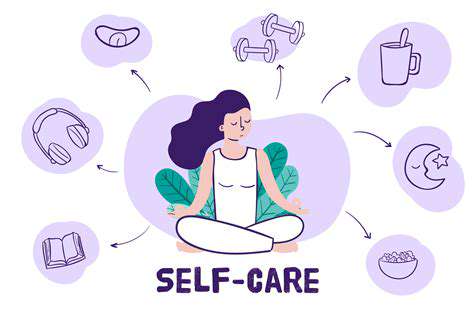The Transformative Power of Mindfulness Meditation for Personal Growth
What is Mindfulness Meditation?
Understanding the Basics of Mindfulness Meditation
Mindfulness meditation is a practice rooted in Buddhist philosophy that emphasizes being present in the moment. It's about paying attention to thoughts, feelings, and sensations without judgment. This approach enables individuals to cultivate a deeper awareness of themselves and their environment.
The practice often involves focusing on the breath as a way to anchor oneself in the present. When distractions arise, practitioners are encouraged to notice them without getting caught up in them. This method builds concentration and enhances one's ability to maintain focus over time.
Additionally, mindfulness meditation can be practiced anywhere and at any time, making it accessible for people with various lifestyles. Even a few minutes of practice each day can lead to significant benefits in emotional regulation and overall well-being.
As mindfulness increases, individuals often find that they can respond to stressors more effectively, ultimately leading to greater resilience and emotional clarity. This foundation establishes the groundwork for personal growth through a deeper understanding of one’s thoughts and behaviors.
The Benefits of Mindfulness Meditation for Personal Growth
Engaging in mindfulness meditation regularly can significantly improve emotional health. Research shows that it can help reduce symptoms of anxiety and depression, allowing individuals to cultivate a more positive outlook on life. This emotional balance is essential for personal growth, as it fosters a willingness to explore one’s thoughts and feelings.
Furthermore, mindfulness meditation encourages self-reflection, which is vital for personal development. Practitioners often gain insights into their habits and patterns, enabling them to make more conscious choices that align with their goals. This increased self-awareness can lead to profound changes in behavior and mindset.
Another key benefit is stress reduction. Mindfulness meditation teaches individuals how to respond to stressful situations more effectively. By creating a pause between stimulus and response, practitioners are better equipped to tackle challenges with a calm and composed mindset.
Finally, as individuals grow in mindfulness, they often develop greater empathy and compassion, both for themselves and others. This interconnectedness enhances relationships and social interactions, providing a supportive network that fosters further personal growth.
Techniques to Incorporate Mindfulness Meditation into Daily Life
Incorporating mindfulness meditation into daily life can be simple and rewarding. One effective technique is to set aside a specific time each day for practice, even if it's just for five to ten minutes. Consistency is key, as regular practice can solidify mindfulness as a habit.
Another technique involves integrating mindfulness into daily activities. Whether it’s eating, walking, or even washing the dishes, practicing mindfulness by paying attention to sensations, sounds, and experiences can help reinforce the principles of meditation throughout the day.
Using guided meditations can also be beneficial for those new to the practice. There are numerous apps and online resources available that cater to various backgrounds and levels of experience, making it easier to find a style that resonates with individual needs.
Finally, it can be helpful to reflect on one’s experiences and insights gained during meditation. Keeping a journal can provide a space to explore thoughts and feelings that arise during practice, paving the way for deeper understanding and personal growth.
Challenges in Practicing Mindfulness Meditation
Despite the numerous benefits, practitioners may encounter challenges when committing to mindfulness meditation. One common issue is difficulty maintaining focus during sessions. The mind often wanders, which can be frustrating for beginners. It's important to remember that this is a natural part of the practice.
Another challenge can be developing patience with oneself. Personal growth and transformation through mindfulness take time, and individuals may feel discouraged if they don’t see immediate results. Cultivating a sense of patience and self-compassion is crucial for deepening the practice and minimizing anxiety around progress.
Some may also struggle with emotional discomfort that arises during meditation. As individuals begin to sit with their thoughts, they may encounter unresolved feelings or memories. Learning to navigate these emotions without judgment is an essential aspect of the mindfulness journey.
Finally, finding the right environment for practice can be a barrier for some. A noisy or busy space can disrupt concentration. Creating a designated quiet area for meditation can enhance the experience and encourage more consistent practice.
The Long-Term Impact of Mindfulness Meditation on Personal Development
Over time, the practice of mindfulness meditation can lead to profound changes in an individual’s life. Many practitioners report increased emotional intelligence, which allows for stronger interpersonal relationships and a deeper understanding of oneself and others.
Additionally, studies suggest that long-term practitioners experience structural changes in the brain associated with improved cognitive function, emotional regulation, and stress reduction. These changes can enhance overall quality of life and contribute to ongoing personal growth.
The long-term commitment to mindfulness also fosters resilience. As individuals learn to navigate life’s ups and downs with a mindful approach, they become more adept at facing challenges. This resilience not only impacts one’s emotional health but also influences personal and professional relationships.
Ultimately, mindfulness meditation serves as a powerful tool for lifelong learning and self-improvement. By consistently engaging with this practice, individuals can continue to explore their inner landscapes, cultivate a sense of purpose, and embrace a fulfilling journey of personal growth.
The Benefits of Practicing Mindfulness Meditation

The Positive Impact on Mental Health
Mindfulness meditation has been shown to significantly reduce symptoms of anxiety and depression. By promoting a greater sense of awareness, practitioners can better manage their thoughts and emotions. This not only leads to a more balanced mental state but also enhances one's overall well-being.
Moreover, individuals who regularly engage in mindfulness practices often report improved self-esteem and resilience. The techniques learned through mindfulness allow for greater acceptance of oneself and one's circumstances, which can be incredibly liberating.
Enhancement of Focus and Concentration
One of the key benefits of mindfulness meditation is its ability to enhance focus and concentration. Through consistent practice, individuals learn to direct their attention more effectively and minimize distractions. This improved ability to focus can lead to increased productivity and efficiency in both personal and professional tasks.
Furthermore, enhanced concentration can facilitate deeper learning and retention of information. As practitioners become more mindful in their daily lives, they are more likely to engage in activities with full attention, contributing to a richer and more fulfilling experience.
Enhancing Emotional Intelligence Through Mindfulness
Understanding Emotional Triggers
Mindfulness meditation encourages individuals to become more aware of their thoughts and feelings without judgment. This heightened awareness can help recognize emotional triggers, which are specific situations or stimuli that elicit strong emotional reactions. By identifying these triggers, individuals can better understand their emotional responses, leading to improved emotional regulation.
For instance, during meditation, one may notice feelings of anger or frustration surfacing. Instead of reacting impulsively, mindfulness practices enable a pause, allowing for reflection on the underlying causes of these emotions. This awareness fosters a deeper connection to oneself, laying the groundwork for greater emotional intelligence.
Cultivating Empathy and Compassion
Another significant aspect of emotional intelligence enhanced by mindfulness meditation is the development of empathy and compassion. Mindfulness encourages individuals to step outside their own experiences and consider the feelings and perspectives of others. This practice not only enriches one's understanding of interpersonal dynamics but also nurtures a sense of connectedness to others.
As individuals progress in their mindfulness practice, they often find themselves more attuned to the emotions of those around them. This increased empathy enables better communication and improved relationships, both personally and professionally. In essence, mindfulness serves as a bridge that connects individual self-awareness to a broader understanding of human experience, ultimately enhancing emotional intelligence.
Mindfulness in Daily Life
Incorporating Mindfulness into Routine Activities
Integrating mindfulness into daily life can significantly enhance overall well-being. Simple activities such as eating, walking, or even showering can become avenues for mindfulness practice. By focusing on the sensations associated with these activities, one can cultivate greater presence and awareness.
For instance, during meals, paying attention to the taste, texture, and aroma of food can transform eating from a mundane task into a sensory experience. This practice encourages savoring each bite, fostering gratitude for nourishment.
Walking can also serve as a perfect opportunity for mindfulness. By concentrating on the movement of the body and the feel of the ground beneath one's feet, individuals can create a meditative state that calms the mind while promoting physical health.
Even routine activities, such as brushing teeth or washing hands, can be turned into mindfulness exercises. By fully engaging with these actions, individuals can cultivate a state of mindfulness that extends throughout their day.
Lastly, nurturing a mindset of mindfulness in everyday affairs encourages an appreciation for the present moment, helping one to navigate challenges with clarity and calmness.
The Benefits of Mindfulness Meditation for Personal Growth
Mindfulness meditation offers an array of benefits that can facilitate personal development. One prominent advantage is its role in reducing stress and anxiety. By training the mind to focus on the present, individuals can learn to detach from overwhelming thoughts and emotions.
This practice enhances emotional regulation, allowing individuals to better manage their responses to stressors. As a result, they may experience improved mood and a greater sense of emotional resilience, which are crucial for personal growth.
Moreover, mindfulness promotes self-awareness. Regular meditation allows individuals to observe their thoughts and feelings without judgment. This observation fosters a deeper understanding of one’s motivations, strengths, and weaknesses, allowing for more informed decision-making.
Additionally, cultivation of compassion is a natural byproduct of mindfulness meditation. As individuals learn to accept their own vulnerabilities, they become more empathetic toward others, enriching relationships and fostering community connections.
Ultimately, the personal growth facilitated by mindfulness meditation leads to a more fulfilling life, characterized by emotional stability, deeper insights, and a profound connection to oneself and others.
Creating a Mindfulness Practice that Works for You
Establishing a personal mindfulness practice requires reflection and experimentation. Individuals should start by identifying the times of day when they can dedicate a few moments to mindfulness meditation. Morning quietude or evening relaxation may prove optimal for many.
Moreover, it's essential to choose a format that resonates with the individual. Whether it's guided meditation, breathing exercises, or mindful movement practices such as yoga or tai chi, the journey will be more enjoyable and meaningful when tailored to personal preferences.
Setting achievable goals can also enhance commitment to the practice. Beginners might aim for just five minutes of mindfulness a day, gradually increasing the duration as comfort grows. This gradual approach minimizes feelings of overwhelm.
Incorporating mindfulness tools, such as journals or meditation apps, can provide structure and motivation. These tools can help track progress and maintain focus on the desired outcomes of mindfulness practice.
Lastly, joining a community or finding a trusted accountability partner can bolster the mindfulness journey, providing support and encouragement, which are instrumental in sustaining a long-term practice.







